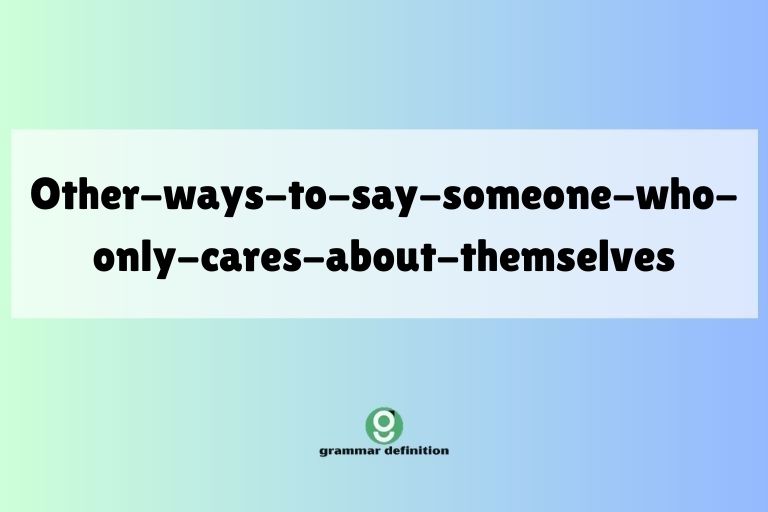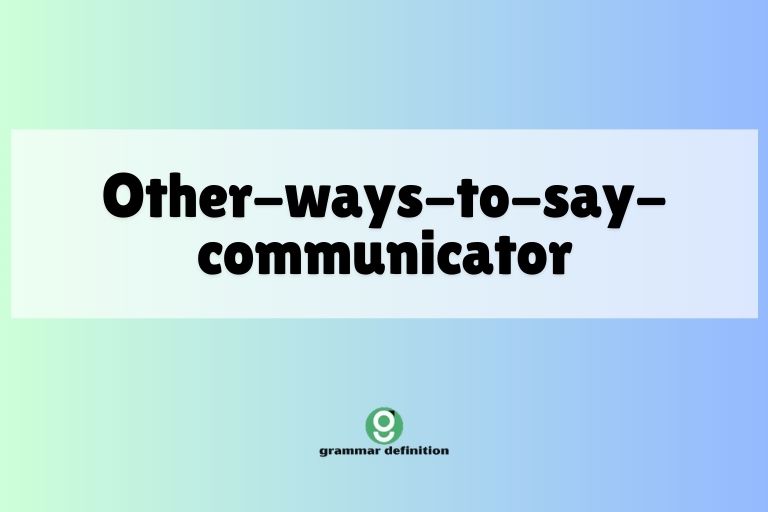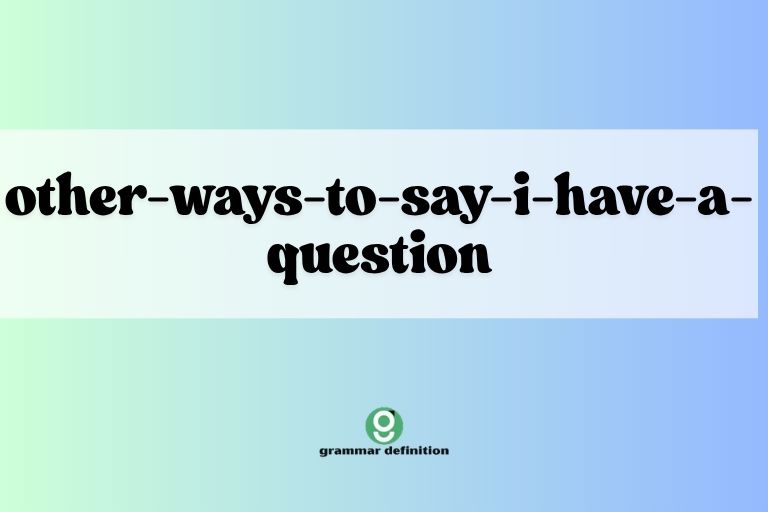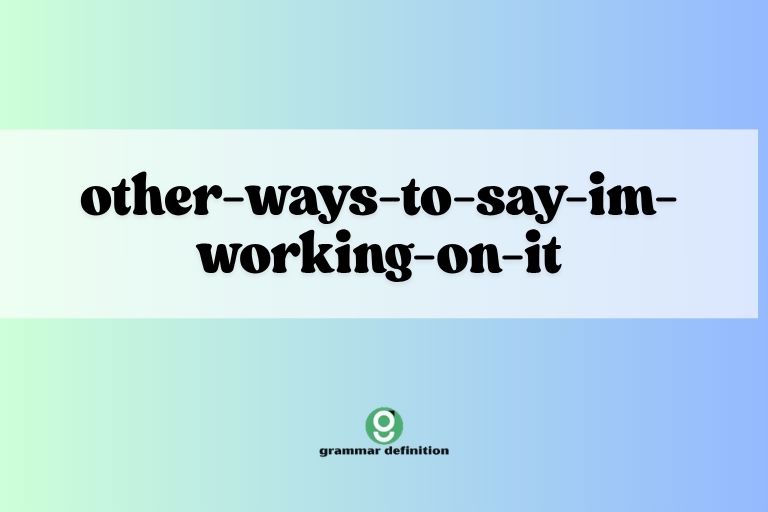Other Ways to Say: Someone Who Only Cares About Themselves

Understanding different ways to describe someone who is self-centered is crucial for effective communication. It not only enriches your vocabulary but also enables you to express nuanced observations about human behavior.
This article delves into various terms and phrases that capture the essence of selfishness, enhancing your grasp of English grammar and usage. Whether you’re an ESL learner, a student aiming to improve your writing, or simply someone keen on expanding your lexical repertoire, this guide offers a comprehensive exploration of this fascinating aspect of language.
By exploring the nuances of these expressions, you will gain a deeper understanding of both language and human psychology. From formal terms to colloquial phrases, we’ll dissect the grammatical structure and contextual usage of each, ensuring you can confidently and accurately describe those who prioritize their own needs above all else.
This knowledge is invaluable for both everyday conversations and formal writing, allowing you to articulate complex social dynamics with precision and clarity.
Table of Contents
- Definition of Self-Centeredness
- Structural Breakdown of Descriptors
- Types and Categories of Self-Centered Behavior
- Examples of Alternative Phrases
- Usage Rules and Considerations
- Common Mistakes to Avoid
- Practice Exercises
- Advanced Topics and Nuances
- Frequently Asked Questions
- Conclusion
Definition of Self-Centeredness
Self-centeredness, at its core, refers to a preoccupation with oneself and one’s own needs, often to the exclusion of others. It manifests as an excessive focus on personal desires, ambitions, and comforts, with a corresponding lack of consideration for the feelings, perspectives, or well-being of those around them.
This trait can range from mild insensitivity to severe narcissism, impacting relationships and social interactions significantly.
In grammatical terms, describing a self-centered person involves using adjectives, nouns, or phrases that convey this characteristic. These can range from direct labels like “selfish” or “egotistical” to more nuanced expressions that imply self-absorption without explicitly stating it.
Understanding the subtle differences between these terms is essential for accurate and effective communication.
Structural Breakdown of Descriptors
The English language provides a variety of grammatical structures to describe self-centered individuals. These structures include adjectives, nouns, and prepositional phrases, each offering a unique way to convey the concept.
Let’s examine the structural components of these descriptors:
- Adjectives: Adjectives directly modify nouns, providing a concise way to describe someone as self-centered. Examples include selfish, egotistical, narcissistic, and self-absorbed. These adjectives can be used in sentences like “He is a selfish person” or “She displays egotistical behavior.”
- Nouns: Nouns can be used to refer to a person who embodies self-centered traits. Examples include egotist, narcissist, and individualist (though the latter can sometimes have positive connotations depending on the context). These nouns can be used in sentences like “He is a complete egotist” or “She’s a narcissist who only talks about herself.”
- Prepositional Phrases: Prepositional phrases offer a more descriptive and nuanced way to express self-centeredness. These phrases typically consist of a preposition followed by a noun or pronoun. Examples include “concerned only with themselves,” “wrapped up in their own world,” and “only interested in their own needs.” These phrases can be used in sentences like “He’s concerned only with himself” or “She’s wrapped up in her own world and doesn’t notice anyone else.”
Understanding these structural elements allows for a more precise and varied expression of self-centeredness, enabling you to choose the most appropriate descriptor for the specific context and individual.
Types and Categories of Self-Centered Behavior
Self-centered behavior manifests in various forms, each with its own nuances and implications. Categorizing these behaviors helps in understanding the spectrum of self-centeredness and choosing the most accurate descriptor.
Here are some key categories:
Egotism
Egotism involves an inflated sense of self-importance and a constant need for admiration. Egotists often dominate conversations, exaggerate their accomplishments, and dismiss the contributions of others.
They believe they are superior and entitled to special treatment.
Narcissism
Narcissism is a more extreme form of self-centeredness, characterized by a grandiose sense of self, a lack of empathy, and a need for excessive admiration. Narcissists often exploit others to achieve their goals and are highly sensitive to criticism.
Self-Absorption
Self-absorption involves being preoccupied with one’s own thoughts, feelings, and experiences to the exclusion of others. Self-absorbed individuals may not intentionally disregard others, but their focus on themselves prevents them from fully engaging in reciprocal relationships.
Selfishness
Selfishness is the most straightforward form of self-centeredness, involving prioritizing one’s own needs and desires above those of others. Selfish individuals may be unwilling to share, compromise, or make sacrifices for the benefit of others.
Lack of Empathy
While not a direct synonym, a lack of empathy often accompanies self-centeredness. Empathy is the ability to understand and share the feelings of others.
Without it, individuals struggle to connect with others on an emotional level, leading to self-focused behavior.
Examples of Alternative Phrases
Here are numerous examples of alternative phrases and words to describe someone who only cares about themselves, categorized for clarity.
Adjectives
The following table presents a range of adjectives that can be used to describe someone who is self-centered. Each adjective carries a slightly different connotation, allowing for precise expression.
| Adjective | Example Sentence |
|---|---|
| Selfish | He’s too selfish to share his toys with other children. |
| Egotistical | Her egotistical attitude makes it difficult to work with her. |
| Narcissistic | The narcissistic CEO only cares about his own image. |
| Self-absorbed | She’s so self-absorbed that she didn’t even notice I was upset. |
| Egocentric | His egocentric worldview prevents him from understanding others’ perspectives. |
| Conceited | He’s too conceited to admit that he’s wrong. |
| Vain | She’s so vain that she spends hours admiring herself in the mirror. |
| Arrogant | His arrogant demeanor makes him unapproachable. |
| Pompous | The pompous professor lectured for hours without taking questions. |
| Boastful | He’s always boastful about his accomplishments. |
| Pretentious | Her pretentious behavior is off-putting. |
| Self-important | He acts like he’s incredibly self-important. |
| Individualistic | While generally positive, his individualistic approach sometimes ignores team needs. |
| Entitled | He has an entitled attitude, expecting special treatment. |
| Inconsiderate | His inconsiderate actions hurt other people’s feelings. |
| Insensitive | She’s often insensitive to the needs of others. |
| Self-serving | His decisions are always self-serving. |
| Materialistic | She’s too materialistic, caring only about possessions. |
| Self-indulgent | He leads a self-indulgent lifestyle. |
| Greedy | His greedy nature drives him to accumulate more wealth. |
| Acquisitive | His acquisitive personality makes him constantly seek more possessions. |
| Possessive | He is extremely possessive of his belongings. |
| Controlling | His controlling behavior stifles everyone around him. |
| Domineering | Her domineering personality makes it hard to collaborate with her. |
| Autocratic | The autocratic manager makes all the decisions himself. |
| Authoritarian | The authoritarian leader demands absolute obedience. |
Nouns
This table showcases nouns that can be used to refer to someone who is primarily concerned with themselves.
| Noun | Example Sentence |
|---|---|
| Egotist | He’s such an egotist; he always talks about himself. |
| Narcissist | She’s a complete narcissist, obsessed with her own image. |
| Individualist | He’s a strong individualist, but sometimes it hurts team efforts. |
| Self-seeker | He’s a blatant self-seeker, always looking for personal gain. |
| Opportunist | She’s an opportunist who exploits every situation for her benefit. |
| Materialist | He’s a materialist, valuing possessions above all else. |
| Hedonist | He’s a hedonist, always seeking pleasure and avoiding pain. |
| Egomaniac | The CEO is an egomaniac who demands constant praise. |
| Autocrat | The dictator was an autocrat who ruled with an iron fist. |
| Tyrant | The tyrant oppressed his people for decades. |
| Despot | The despot ruled with absolute power, silencing all opposition. |
| Dictator | The dictator controlled every aspect of people’s lives. |
| Control freak | She’s such a control freak; she needs to manage everything. |
| Perfectionist | His being a perfectionist can be both a strength and a weakness. |
| Attention seeker | He’s such an attention seeker; he always craves the spotlight. |
| Drama queen | She’s such a drama queen; she exaggerates everything. |
| Glory hound | He’s a glory hound, always seeking recognition for his actions. |
| Power monger | The politician is a power monger, striving for absolute control. |
| Dominator | The dominator always needs to be in charge. |
| Boss | He acts like a boss, even when he’s not in charge. |
| Micro-manager | She is a micro-manager, watching everyone’s every move. |
| Exhibitionist | He is an exhibitionist, always seeking attention through flamboyant displays. |
| Show-off | She is a total show-off, always trying to impress everyone. |
| Braggart | He is a braggart, constantly boasting about his achievements. |
Phrases
The following table provides phrases that describe someone who only cares about themselves, offering a more nuanced perspective.
| Phrase | Example Sentence |
|---|---|
| Only cares about themselves | He only cares about himself and his own needs. |
| Is wrapped up in their own world | She is wrapped up in her own world and doesn’t notice anyone else. |
| Is full of themselves | He is full of himself and thinks he’s better than everyone else. |
| Is self-obsessed | She is self-obsessed and constantly talks about her appearance. |
| Is only interested in their own needs | He is only interested in his own needs and ignores everyone else’s. |
| Thinks the world revolves around them | She thinks the world revolves around her and expects special treatment. |
| Has an inflated ego | He has an inflated ego and can’t take criticism. |
| Lacks empathy | She lacks empathy and doesn’t understand others’ feelings. |
| Is insensitive to others | He is insensitive to others and often hurts their feelings. |
| Is inconsiderate of others | She is inconsiderate of others and doesn’t think about their needs. |
| Is only in it for themselves | He is only in it for himself and doesn’t care about the team. |
| Puts themselves first | She always puts herself first, even at the expense of others. |
| Is self-centered to a fault | He is self-centered to a fault and can’t see beyond his own desires. |
| Is blind to the needs of others | She is blind to the needs of others because she is so focused on herself. |
| Lives in their own little bubble | He lives in his own little bubble, oblivious to the world around him. |
| Is lost in their own thoughts | She is lost in her own thoughts and doesn’t pay attention to others. |
| Is too focused on their own problems | He is too focused on his own problems to help anyone else. |
| Is absorbed in their own interests | She is absorbed in her own interests and neglects her responsibilities. |
| Is preoccupied with themselves | He is preoccupied with himself and doesn’t listen to others. |
| Is fixated on their own appearance | She is fixated on her own appearance and spends hours getting ready. |
Similes and Metaphors
Using similes and metaphors can add vividness and depth to your descriptions. Here’s a table illustrating how they can be used to describe someone self-centered.
| Simile/Metaphor | Example Sentence |
|---|---|
| A black hole of need | He’s a black hole of need, constantly demanding attention and never giving back. |
| A mirror reflecting only themselves | She’s like a mirror reflecting only herself, unable to see anyone else’s perspective. |
| Living in their own echo chamber | He’s living in his own echo chamber, only hearing and validating his own opinions. |
| The sun in their own universe | She sees herself as the sun in her own universe, with everyone else revolving around her. |
| Like an island, isolated and self-contained | He’s like an island, isolated and self-contained, with no connection to the mainland. |
| A bottomless pit of self-regard | She has a bottomless pit of self-regard, constantly seeking validation and never feeling satisfied. |
| As if they’re the main character in a play | He acts as if he’s the main character in a play, with everyone else as supporting cast. |
| A one-way street of attention | Their relationship is a one-way street of attention, with all focus directed towards them. |
| Like a broken record, repeating their own praises | He’s like a broken record, repeating his own praises over and over again. |
| The center of their own self-made solar system | She considers herself the center of her own self-made solar system, with everything orbiting her. |
| A self-proclaimed monarch in their own kingdom | He acts like a self-proclaimed monarch in his own kingdom, demanding everyone’s obedience. |
| An echo of their own voice, amplified and distorted | She only hears an echo of her own voice, amplified and distorted, unable to listen to others. |
| A closed book, unreadable and indifferent to others | He’s a closed book, unreadable and indifferent to others, unwilling to share his feelings or thoughts. |
| A self-sustaining ecosystem of ego | She has created a self-sustaining ecosystem of ego, thriving on admiration and attention. |
| Like a spotlight, always focused on themselves | He’s like a spotlight, always focused on himself, never shining light on others. |
| A universe contained within their own head | She lives in a universe contained within her own head, disconnected from reality. |
| The protagonist of their own never-ending story | He sees himself as the protagonist of his own never-ending story, with everyone else as supporting characters. |
| A self-appointed expert on everything | She acts like a self-appointed expert on everything, dismissing everyone else’s opinions. |
| A fortress of self-importance, impenetrable to empathy | He has built a fortress of self-importance, impenetrable to empathy, unable to connect with others’ feelings. |
| Like a compass pointing only to themselves | She’s like a compass pointing only to herself, never considering the needs of others. |
Usage Rules and Considerations
When using these terms, it’s essential to consider the context and the specific nuances of each word or phrase. Here are some key usage rules and considerations:
- Formality: Some terms, like “narcissistic” or “egotistical,” are more formal and clinical, while others, like “full of themselves” or “only cares about themselves,” are more colloquial. Choose the language that is appropriate for the situation.
- Severity: The terms vary in severity. “Selfish” is a relatively mild term, while “narcissistic” implies a more serious personality disorder. Use the term that accurately reflects the behavior you are describing.
- Context: The meaning of some terms can change depending on the context. For example, “individualistic” can be positive in some situations, implying independence and self-reliance, but negative in others, implying a disregard for the needs of the group.
- Objectivity: It’s important to be as objective as possible when describing someone as self-centered. Avoid exaggeration and personal attacks. Focus on specific behaviors rather than making sweeping generalizations.
- Sensitivity: Be mindful of the impact your words can have on others. Describing someone as self-centered can be hurtful, so use these terms with caution and sensitivity.
Common Mistakes to Avoid
Using these terms incorrectly can lead to misunderstandings and misinterpretations. Here are some common mistakes to avoid:
| Incorrect | Correct | Explanation |
|---|---|---|
| He is very individual. | He is very individualistic. | “Individual” is a general term, while “individualistic” specifically implies a focus on oneself. |
| She has a lot of ego. | She is egotistical. | “Ego” is a concept, while “egotistical” is an adjective describing someone with a large ego. |
| He is a self-absorb. | He is self-absorbed. | “Self-absorbed” is an adjective; “self-absorb” is not a word. |
| She is only care about herself. | She only cares about herself. | The correct phrase is “only cares about herself.” |
| He is a narcissism. | He is a narcissist. | “Narcissist” is the correct noun form. |
| She is full of herselfly. | She is full of herself. | “Full of herself” is the correct phrase; “herselfly” is not a word. |
| He lacks of empathy. | He lacks empathy. | The correct phrase is “lacks empathy.” |
| She is insensitive with others. | She is insensitive to others. | The correct preposition is “to.” |
| He is inconsiderate for others. | He is inconsiderate of others. | The correct preposition is “of.” |
| She thinks the world revolves around I. | She thinks the world revolves around her. | The correct pronoun is “her.” |
Practice Exercises
Test your understanding with these practice exercises. Choose the best word or phrase to complete each sentence.
Exercise 1: Fill in the Blank
Choose the most appropriate word from the options provided to complete the following sentences.
| Question | Options | Answer |
|---|---|---|
| 1. He’s so ____; he always talks about his achievements. | a) humble, b) boastful, c) modest | b) boastful |
| 2. She’s a ____; she only cares about her own needs. | a) altruist, b) philanthropist, c) selfish | c) selfish |
| 3. His ____ attitude makes it difficult to work with him. | a) considerate, b) egotistical, c) thoughtful | b) egotistical |
| 4. She’s so ____ that she didn’t even notice I was upset. | a) empathetic, b) self-absorbed, c) considerate | b) self-absorbed |
| 5. The ____ CEO only cares about his own image. | a) humble, b) narcissistic, c) modest | b) narcissistic |
| 6. He’s too ____ to admit that he’s wrong. | a) humble, b) conceited, c) modest | b) conceited |
| 7. She’s so ____ that she spends hours admiring herself in the mirror. | a) plain, b) vain, c) ordinary | b) vain |
| 8. His ____ demeanor makes him unapproachable. | a) friendly, b) arrogant, c) kind | b) arrogant |
| 9. The ____ professor lectured for hours without taking questions. | a) approachable, b) pompous, c) humble | b) pompous |
| 10. He always acts so ____, like he’s incredibly important. | a) self-important, b) unassuming, c) modest | a) self-important |
Exercise 2: Sentence Rewriting
Rewrite the following sentences using a different word or phrase to describe the self-centered behavior.
| Original Sentence | Rewritten Sentence |
|---|---|
| 1. He’s so selfish; he never shares anything. | He only cares about himself and never shares anything. |
| 2. She’s a narcissist who only talks about herself. | She’s self-obsessed and constantly talks about her appearance. |
| 3. He’s an egotist with an inflated sense of self-worth. | He is full of himself and thinks he’s better than everyone else. |
| 4. She’s wrapped up in her own world and doesn’t notice anyone else. | She lives in her own little bubble, oblivious to the world around her. |
| 5. He lacks empathy and doesn’t understand others’ feelings. | He is insensitive to others and often hurts their feelings. |
| 6. She’s inconsiderate of others and doesn’t think about their needs. | She puts herself first, even at the expense of others. |
| 7. He’s only in it for himself and doesn’t care about the team. | He is only interested in his own needs and ignores everyone else’s. |
| 8. She’s blind to the needs of others because she is so focused on herself. | She is too focused on her own problems to help anyone else. |
| 9. He lives in his own little bubble, oblivious to the world around him. | He is lost in his own thoughts and doesn’t pay attention to others. |
| 10. She thinks the world revolves around her and expects special treatment. | She has an entitled attitude, expecting special treatment. |
Exercise 3: Matching
Match the word with its corresponding definition.
| Word | Definition |
|---|---|
| 1. Egotistical | a. Excessively conceited or absorbed in oneself; self-centered. |
| 2. Narcissistic | b. Having an excessive admiration of oneself. |
| 3. Selfish | c. Lacking consideration for others; concerned chiefly with one’s own personal profit or pleasure. |
| 4. Conceited | d. Excessively proud of oneself; vain. |
| 5. Inconsiderate | e. Thoughtlessly causing inconvenience or hurt to others. |
Answers: 1-a, 2-b, 3-c, 4-d, 5-e
Advanced Topics and Nuances
For advanced learners, understanding the psychological underpinnings of self-centeredness can provide a deeper appreciation for the nuances of these terms. Consider the following:
- Personality Disorders: Terms like “narcissistic” are often associated with personality disorders. Understanding the diagnostic criteria for Narcissistic Personality Disorder (NPD) can help you use the term more accurately.
- Developmental Psychology: Self-centeredness is a normal part of child development. Understanding the stages of development can help you differentiate between normal self-focus and problematic self-centeredness.
- Cultural Differences: The perception of self-centeredness can vary across cultures. What is considered normal in one culture may be seen as selfish in another.
Frequently Asked Questions
Here are some frequently asked questions about describing someone who only cares about themselves:
- What is the difference between “selfish” and “egotistical”?
“Selfish” implies prioritizing one’s own needs above others, while “egotistical” implies an inflated sense of self-importance and a need for admiration. A selfish person may simply want to satisfy their own desires, while an egotistical person needs to feel superior to others.
- Is “individualistic” always a negative term?
No, “individualistic” can be positive in some contexts, implying independence and self-reliance. However, it can be negative if it implies a disregard for the needs of the group or a lack of cooperation.
- How can I describe someone who is self-centered without being offensive?
Focus on specific behaviors rather than making sweeping generalizations. Use milder terms like “inconsiderate” or “self-absorbed” instead of harsher terms like “narcissistic.” Be sensitive to the impact your words can have on others.
- What are some signs that someone is self-centered?
Signs include constantly talking about themselves, dominating conversations, lacking empathy, ignoring others’ feelings, prioritizing their own needs above others’, and expecting special treatment.
- Is it possible for someone to change their self-centered behavior?
Yes, but it requires self-awareness, a willingness to change, and often professional help. Therapy can help individuals understand the root causes of their self-centered behavior and develop healthier patterns of relating to others.
- How do I deal with a self-centered person in my life?
Set boundaries, communicate your needs clearly, and avoid getting drawn into their drama. Focus on your own well-being and don’t expect them to change overnight. If the relationship is toxic, consider limiting contact or ending it altogether.
- What’s the difference between being assertive and being selfish?
Assertiveness involves standing up for your rights and needs in a respectful manner, while selfishness involves disregarding the rights and needs of others. An assertive person considers the feelings of others, while a selfish person does not.
- Can self-centeredness be a symptom of a mental health condition?
Yes, extreme self-centeredness can be a symptom of certain mental health conditions, such as Narcissistic Personality Disorder (NPD). It’s important to consult with a mental health professional for diagnosis and treatment.
Conclusion
Mastering alternative ways to describe someone who only cares about themselves is a valuable skill for effective communication. By understanding the nuances of these terms and their appropriate usage, you can express yourself with greater precision and sensitivity.
Remember to consider the context, severity, and potential impact of your words when describing someone as self-centered.
This exploration has covered a spectrum of descriptors, from adjectives and nouns to phrases and metaphors, providing a comprehensive toolkit for nuanced expression. Continue to practice and refine your understanding of these terms, and you’ll be well-equipped to navigate complex social dynamics with confidence and clarity.
Remember that language is a powerful tool, and using it thoughtfully can foster understanding and empathy in your interactions with others. Keep practicing and exploring, and you’ll continue to expand your linguistic capabilities.






